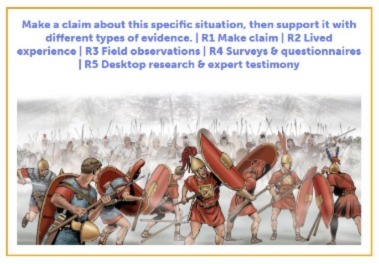
Make a claim about this specific situation, then support it with different types of evidence. | R1 Make claim | R2 Lived experience | R3 Field observations | R4 Surveys & questionnaires | R5 Desktop research & expert testimony
Make a claim about this general trend, then support it with different types of evidence. | R1 Make claim | R2 Lived experience | R3 Field observations | R4 Surveys & questionnaires | R5 Desktop research & expert testimony

